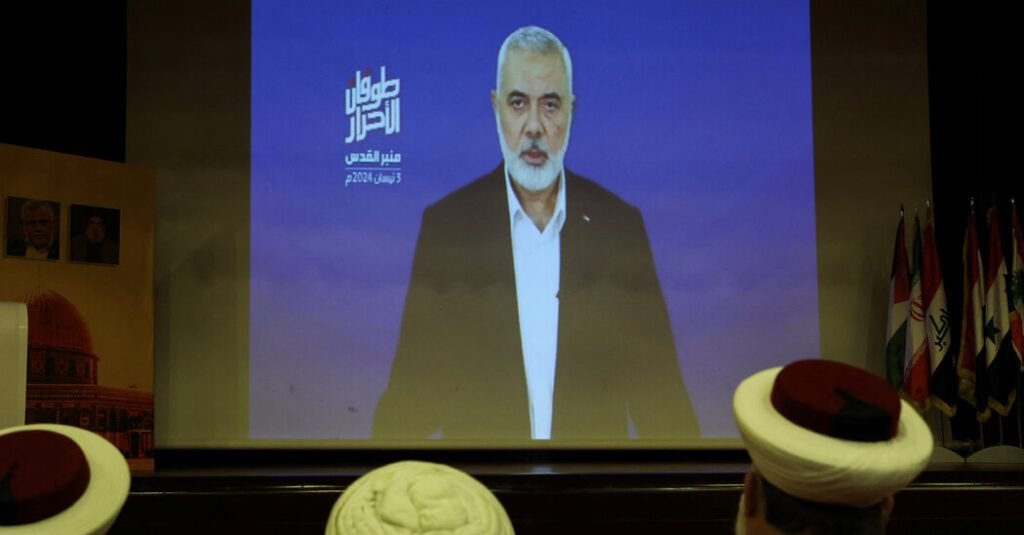As Eid al-Fitr approached, Amani Abu Awda’s four children began asking her for new clothes and toys – festive items that Muslims usually buy to celebrate the holiday that marks the end of the holy month of Ramadan.
But the mother of four from northern Gaza is now displaced with her family in a tent in the southern town of Rafah, far from any sense of celebration and the home that once hosted large family gatherings.
“My God, I couldn’t get anything from them because of the high prices,” he said on Saturday, days before most Muslims around the world celebrate Eid al-Fitr. “I had to try to find used clothes. In normal days, we would never buy such things. But I couldn’t even find used clothes.”
Eid al-Fitr – the three-day celebration starting on Wednesday that marks the end of the holy month of Ramadan – was a joyous time in Gaza. But with starvation threatening Gaza amid Israel’s ongoing military offensive, Palestinians there say there is little to celebrate.
Ms Abu Awda’s family managed to take some clothes with them when they left their home in Jabaliya two months ago. But at one checkpoint, Israeli soldiers forced them to throw away what they were carrying as they walked down a dangerous road where some Palestinians had disappeared in custody and others had been killed in Israeli airstrikes, he said.
“What kind of Eid is this?” Ms Abu Awda said, adding: “We have lost so much. We lost family and loved ones. We lost our homes and we lost security. The feeling of death is with us every moment and the smell of death is everywhere.”
More than anything, Ms. Abu Awda said, they want a ceasefire for Eid.
Just as Ramadan, a month of daily fasts and religious holidays, was marked by bittersweet memories of how it was observed before Israel’s war on Gaza, Eid will be marked by fond comparisons of how different things were just a year ago. .
before the war Malls would be full of families buying new holiday clothes and sweets to give to all the relatives who would come to visit in the days leading up to Eid.
Now those relatives are almost all displaced, packed into small houses with others or in suffocating plastic sheet tents.
Many Muslims in the Middle East they visit the graves of their loved ones on Eid. But with so many dead since the war began in October, and with many of them buried in makeshift graves or still being pulled from the rubble, maintaining this tradition is now impossible for most.
Gaza’s health ministry says more than 33,000 people have been killed in Gaza during six months of Israeli bombardment.
In Gaza City, some people have strung small lights or paper decorations in the streets. But it hasn’t done much to combat the general gloom, said Alina Al-Yazji, a 20-year-old university student.
“The streets, instead of smelling of biscuits and mamools and sumacs and fashes and all these wonderful smells,” Ms Al-Yazji said, citing some of the traditional sweet and savory dishes eaten during Eid, “instead of this, the streets smell of blood. and killing and destruction.”
As he spoke, the sound of an Israeli fighter jet roared overhead.
Sitting in her tent in Rafah, Muna Daloob, 50, couldn’t help but think back to the previous holiday, before her family left their home in Gaza City.
She said she doesn’t make Eid cookies or mamool or fasih because she doesn’t have cooking gas and all the ingredients, including flour and sugar, are too expensive or in short supply.
She held out hope that she could at least find — and afford — the smallest of gifts to bring a smile to her grandchildren: a lollipop.
For 22-year-old Mohammad Shehada, like other Palestinian men, Eid comes with the expectation of giving monetary gifts, called eidiya.
In most Muslim cultures, adults give small eidiyas to children. But Palestinians give the money to both children and adult female relatives. Even before the war, some Palestinian men in Gaza struggled to afford to give eidiya as a result of a 17-year land, air and sea blockade of Gaza imposed by Israel and supported by Egypt. Now, in the midst of war, eidiya will be completely impossible for most people.
“The joy of children gathering around you when you give them an eidiya, we cannot give that this year and we will feel ashamed,” he said.
Mr Sehanda hoped that some mosques, most of which have become shelters for Gaza’s many displaced citizens, would still hold Eid morning prayers. He hoped he would be able to eat faseekh, a fermented fish dish, the simplest of Eid delights, he said.
“I have high hopes for Eid,” he said, “but first they end this revolutionary war.”

